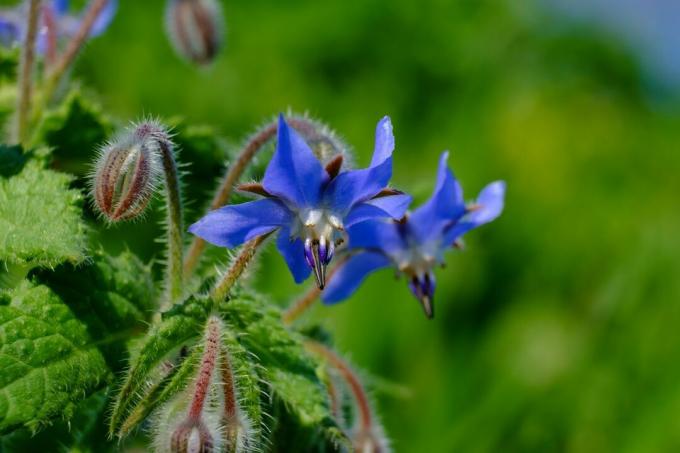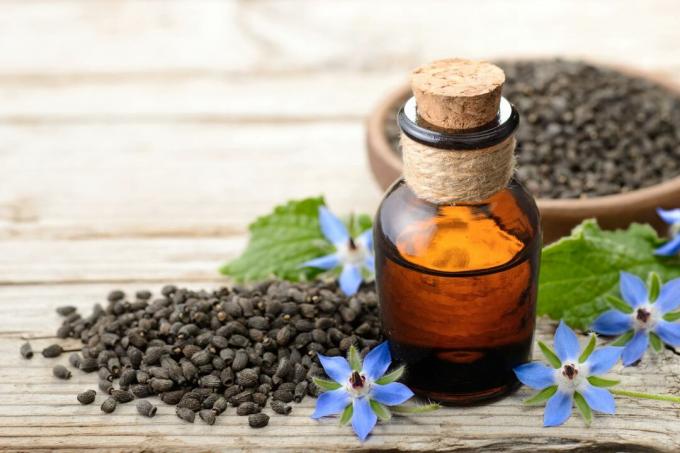The herb with the beautiful blue flowers has repeatedly fallen into disrepute for being poisonous. Here you can find out whether borage is poisonous for humans or animals.

Borage (Borago officinalis) is a popular herb. It is often used in Frankfurt green sauce, in herb quark or in cucumber salad. But is it actually safe to eat borage? Or is the herb actually poisonous? In this article we explain whether borage is poisonous for humans or animals and how it can be used as a remedy.
contents
- Does borage contain toxic substances?
- Is borage poisonous to humans?
- Is borage poisonous to animals?
- Borage: used as a medicinal herb
Does borage contain toxic substances?
Borage has a very special taste: the herb with the prickly leaves tastes fresh and is reminiscent of cucumbers. That is why it is often used in various herbal dishes. The blue flowers also often decorate salads or starters. So is it possible that borage is poisonous? Borage contains alkaloids. These so-called secondary phytonutrients serve the plant to ward off predators. In borage, these are pyrrolizidine alkaloids. These can also be found in other predatory plants, for example in
Comfrey (Symphytum) and Adderhead (Echium). Pyrrolizidine alkaloids are made up of various substances, each of which is poisonous in itself.Poisonous alkaloids in borage:
- Amabiline
- Intermediate
- Lycopsamine
- Supinine
- Thesinine
The alkaloids are mainly found in the leaves, flowers and stems of the aromatic herb. In contrast, the substance cannot be found in the seeds. Borage oil is therefore harmless to health.

Is borage poisonous to humans?
Even if the borage contains poisonous pyrrolizidine alkaloids, humans do not have to do without it completely. Because the dose is known to make the poison. You can eat borage in small quantities without any problems - this is what the Federal Institute for Risk Assessment says. A maximum of three grams of borage per day is harmless for an adult. However, you should avoid borage in high concentrations, for example in dried plant powder for smoothies or in juice. Pregnant women, breastfeeding women and small children should also be careful. Even small amounts of the alkaloids can be harmful to small children, which is why children should not eat borage. And since the plant substances can reach the child via breast milk or during pregnancy, pregnant women and breastfeeding women should also avoid the herb in any case.
Is borage poisonous to humans?
- Borage contains poisonous alkaloids
- These are liver-damaging in large quantities
- Smaller amounts are safe for adults
- Maximum 3 grams per day
- Pregnant women, breastfeeding women and young children should not eat borage

Is borage poisonous to animals?
If animals such as dogs, cats or guinea pigs nibble on borage, you don't have to worry about your four-legged friends. Although the animals ingest small amounts of alkaloids through nibbling, these do not harm the animals in small doses. In addition, the bitter substances present in the leaves ensure that borage tastes inedible to animals. Therefore, your furry roommate will probably not nibble on your borage a second time.
Borage: used as a medicinal herb
Borage has been used as a remedy since the Middle Ages. Both the leaves and flowers as well as the seeds are used. Borage herb is used in the manufacture of homeopathic remedies to lighten the mood and calm the heart rhythm system. In addition, the leaves are said to have an anti-inflammatory effect. Borage oil has recently been rediscovered as a healing tool. The high content of gamma-linolenic acid in the seeds makes it particularly attractive. When applied to the skin, borage oil is said to have anti-inflammatory, decongestant and antipruritic properties.
Even more interesting and interesting facts about the Cucumber herb can be read here.



